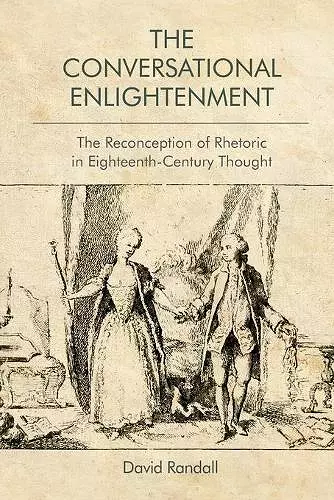The Conversational Enlightenment
The Reconception of Rhetoric in Eighteenth-Century Thought
Format:Paperback
Publisher:Edinburgh University Press
Published:10th Nov '20
Should be back in stock very soon

The ever-widening application of conversational style created a conversational Enlightenment The Conversational Enlightenment traces the spread of the concept of conversation during the Enlightenment, including the project of politeness, the fine arts, philosophy and public opinion. The book narrates this triumph of conversational style and thought partly as a succession to the oratorical rhetoric that characterised the Renaissance and partly as the victory of the only mode of speech that recognised women as women, and not as imitation men. It also rewrites Jürgen Habermas’ history of the public sphere as the history of rational conversation. Key Features: The first book-length intellectual history of Enlightenment conversation in EnglishSynthesises a great deal of Enlightenment intellectual history within the frameworks of rhetoric and conversationPuts women’s speech at the heart of the history of Enlightenment rhetoricFuses Habermas’ historical-theoretical framework to the history of rhetoric, revising both
In this bold and wide-ranging investigation, Randall shows how the Western rhetorical tradition illuminates conversation and its impact on literature, philosophy and art in eighteenth-century Britain, France and America. What emerges is an account of the politics of conversation that reconfigures our understanding of the eighteenth-century communicative domain. * Lawrence E. Klein, University of Cambridge *
Conversation' is a notoriously difficult topic to tackle sensibly (about as hard as 'a history of tears,' says French scholar Marc Fumaroli) but David Randall has cracked it. Most originally, he identifies a 'conversational aesthetic' that might have begun in France but quickly extended right across Europe in the eighteenth century and invaded art, architecture, dance, music being conceived as a form of conversation among instruments). He shows how conversation was associated with liberty and that compared with rhetoric, conversation calmed the passions and in so doing helped to clarify the mind, eventually giving rise to the power of public opinion. Fascinating in its range of detail. * Peter Watson, Author of Ideas: A History from Fire to Freud and, forthcoming, The French Mind *
The sheer amount of material [this book covers] is at least half the appeal. Randall weaves a thick, elaborate, and mostly seamless tapestry from sometimes disparate threads. He prefers to let the texts speak for themselves, drawing his conclusions following lengthy quotations in English, French, and Italian. The other half of the [book's] appeal, then, is in Randall’s nimble analyses. For instance, he finds persuasive geographical, temporal, and conceptual continuities to demonstrate the significance of natural law jurisprudence’s emphasis on self-preservation, an emphasis that runs from Hugo Grotius, Thomas Hobbes, and Samuel Pufendorf through to the link between sociability, on theone hand, and behavior and manners, on the other. -- James Donathan Garner, University of Texas at Austin * Rhetorica *
ISBN: 9781474448673
Dimensions: unknown
Weight: 460g
296 pages